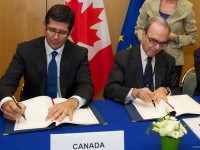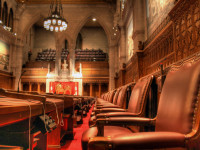Earlier this year, Canada and the European Union announced that they had reached agreement on sharing airline passenger name record data. The data shared includes names, addresses, and credit card numbers of airline passengers. The agreement was signed in June (video of the signing here), but approval from the European Parliament was required. In light of growing privacy concerns, that approval has proven more difficult to obtain than previously anticipated.
Rather than simply grant approval, the European Parliament has narrowly voted to send the agreement to the European Court of Justice for review to ensure that it is compliant with European law including EU treaties and the European Charter of Rights and Freedoms (the final vote was 383 to 271 with 47 abstentions). The resolution notes that the European Data Protection Supervisor (effectively the Privacy Commissioner for the EU) issued an opinion in September 2013 that questioned the necessity and proportionality of agreements to transfer passenger information between jurisdictions. The EDPS opinion features an extensive review of the agreement and raises pointed questions about specific provisions along with numerous recommendations for reform.
The decision means that the Canada – EU data sharing agreement will be delayed by at least one to three years while the court conducts its review. The review will raise several important privacy issues including the effectiveness of exchanging passenger information in combating terrorism and the state of Canadian privacy law. The European Court of Justice has already struck down the European Data Retention Directive, suggesting that this agreement could also face tough scrutiny.











